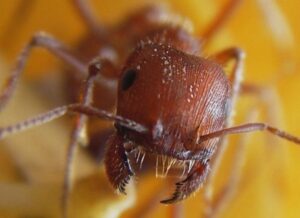5 Natural Ways to Keep Ants at Bay

For such diminutive critters – measuring between a mere 1/16th of an inch to a far more generous yet still itty bitty ¼ of an inch – we certainly spend a lot of time and money waging war against those pesky ants. If the Home Depots and Lowe’s home improvement centers of the world are any indication, there are at least 10 – 15 products specifically designed to stop wayward ants dead in their tracks, but the packaging rarely focuses on the consequences to human health (and the environment) when we liberally spray and sprinkle such chemical aids around the confines of our home.
Note to self: Poison is as poison does. You definitely don’t want to employ the 5 second rule with a piece of gum or even a far-too-scrumptious cookie dropped smack dab in the middle of an ant-chemical warfare zone. Come to think of it, you might also want to strap a gas mask on prior to dropping a chemical stink bomb on your orphaned ant community.
Better yet, why not make this year the one that you finally commit to purging toxins from your personal environment altogether? While I’d be more than happy to regale you with tales of why ants are deserving of relocation rather than mass annihilation, perhaps that is fodder for a future article. For now, let’s cut to the chase by rolling out the red carpet for five naturally surprising yet remarkably effective ant deterrents that will help you to clean up your act while giving the heave ho to the buggy freeloaders in your midst.
Draw A (White) Line
Ants really detest the active ingredient in baby powder and chalk, which happens to be potentially cancerous talcum powder… so perhaps they’re far wiser than we give them credit for? Talc is the very same compound that we gingerly rub into tender baby derrieres as well as our delicate eye areas – read the ingredient list of your favorite infant personal care product or cosmetic for confirmation – so you might want to just ‘recycle’ your eye shadow quad by pulverizing it with a mortar and pestle, sprinkling it across ant invasion points and then purchasing a far more eco- and eyeball-friendly replacement for your personal use.
White Vinegar-Tea Tree Oil Combo
The acetic acid content of white vinegar – which releases a distinctively odiferous tang that eco-domestic doyennes love to hate – apparently offends the olfactory senses of ants just as much, plus it wipes out all traces of the scent trails that they lay in order to navigate their territory effectively. By coupling it with the naturally antiseptic, antiviral, antifungal and antibacterial powers of melaleuca oil (which is incredibly toxic to insects of all kinds), ooooh lordy, they won’t know what hit them.
Strategically Selected Spices
Flavoring agents that contain high concentrations of naturally volatile oils — such as bay leaves, thyme, cinnamon, ground red pepper, fennel, rosemary, cloves and even mint – are inherently repellent to various insects. In fact, freshly ground cinnamon and cinnamomum cassia oil have both been found in laboratory tests to kill off mosquito larvae while basil and peppermint put the kibosh on the reddish-brown beetle known as the bruchid or cowpea. As for our frenemies the ants, they are so sensitive to strong odors that using any plant-based spice that is particularly potent will immediately send them packing.
Mint Tea Bags
Surely you’ve long pondered how to best recycle your spent mint tea bags and now – finally! — that triumphant day has arrived. While composting them, making handy-dandy eye compresses or using the pigment to dye fabric and/or paper are all worthy applications, you might want to give their ant deterring properties a whirl. If you don’t mind adorning your ant entry points with soggy used bags (which will dry up lickety-split), they’ll turn up their noses right fast and spread the word that your crib really stinks.
Fruit and Veggie Peels
Cucumber – such a refreshing edible and sensory experience for humans – is oddly enough one of the last things that ants want to inhale or even munch on at close range. The next time you peel the dark green skin from the exterior of your cukes, divert them from your compost pile (at least temporarily) by faking out your unwanted ant population instead. Creating a cucumber peel ‘barrier’ apparently works almost as well as enlisting the help of citrus peels, the latter of which naturally rock Limonene and Linalool insecticidal compounds that immediately poison ants and other sorry little critters on contact. Kinda makes you feel somewhat remorseful… yeah, not so much.
Image: Jurvetson
For more juicy green goodness, follow Elizah via Twitter @elizahleigh

